|
|
|
Sort Order |
|
|
|
Items / Page
|
|
|
|
|
|
|
| Srl | Item |
| 1 |
ID:
192202
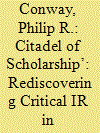

|
|
|
|
|
| Summary/Abstract |
‘Critical’ international relations (IR) is usually understood to have originated in the early 1980s. However, a close reading of Vithal Rajan’s ‘An Epitaph for Detached Scholarship’, published in the inaugural issue of Millennium in 1971, tells another story. Rajan’s article was not a work of critical theory per se, but it was in tune with demands, at this time, for establishing a ‘critical university’. Promising to open up university education to all, dispensing with traditional curricula and authoritarian modes of teaching, the critical university, like Rajan’s article, has long since been forgotten. Nevertheless, this moment set the scene for the professionalised establishment of ‘critical’ academia in the decades to come. Rediscovering Rajan’s ‘Epitaph’ thus offers to reconnect critical IR with an earlier, and perhaps more generative, moment of inception. Indeed, even today, Rajan’s creative, provocative, playful text stands out as a rewardingly undisciplined contribution to the discipline.
|
|
|
|
|
|
|
|
|
|
|
|
|
|
|
|
| 2 |
ID:
101842
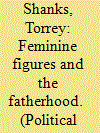

|
|
|
|
|
| Publication |
2011.
|
| Summary/Abstract |
Traditionally neglected, Locke's First Treatise of Government has taken on new significance with feminist interpretations that recognize the importance of its sustained engagement with patriarchal power. Yet feminist interpreters, both critics and admirers alike, read Locke as a champion of the "man of reason," a figure seemingly immune to the influences of passions, imagination, and rhetoric. These interpreters wrongly overlook Locke's extended engagement with the power of rhetoric in the First Treatise, an engagement that troubles the clear opposition of masculine reason and its feminine exclusions. Taking Locke's rhetoric seriously, I argue, makes the First Treatise newly important for what it shows us about Locke's practice of political critique. In following the varied and novel effects of Locke's feminine figures, we find a practice of political critique that depends on a mutually constitutive relation between rhetoric and reason.
|
|
|
|
|
|
|
|
|
|
|
|
|
|
|
|
| 3 |
ID:
192128
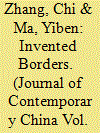

|
|
|
|
|
| Summary/Abstract |
Patriotic campaigns and mass mobilization draw on existing xenophobic attitudes of the public, reinforcing the ‘us vs. them’ dualism between China and ‘the West’. However, patriotic campaigns are not always top-down, state-led, nor are they always primarily driven by political ideology. Patriotic content appeals to a growing nationalist audience who consumes a mixed feeling of perceived victimization at the hand of foreign aggression and the pride arising from being a Chinese citizen. This paper argues that the profitability of patriotic content circulating on social media exacerbated the tension between market-driven grassroots patriotism and state-led patriotic campaigns. The tension grows out of, and is manifested in, the online popular debate around economically driven, grassroots ‘patriotic’ content that can challenge the state state-led patriotic rhetoric. While the state sometimes strategically co-opts some patriotic contents into its own patriotic narratives, it also delegitimises other undesired ones through labels such as ‘high-level black’ (gaoji hei) or ‘low-level red’ (diji hong). These labels were initially used to differentiate meticulously crafted political satire and parody from incompetent, illogical and vulgar propaganda pieces that unintendedly blemish the state’s patriotic campaigns, but later evolved into an exercise of power to distance the CCP from undesired patriotic content.
|
|
|
|
|
|
|
|
|
|
|
|
|
|
|
|
| 4 |
ID:
181091
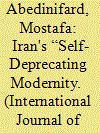

|
|
|
|
|
| Summary/Abstract |
Extant studies of Iranian nationalism accentuate the self-aggrandizing side of Iranian modernity, mainly achieved through, and informing, a process of otherizing certain non-Persians/Iranians, particularly the Arabs. I argue that equally important to understanding Iranian modernity is its lesser recognized, shameful and self-demeaning face, as manifested through a simultaneous 19th-century discourse, which I call “self-deprecating modernity.” This was an often self-ridiculing and shame-inducing, sometimes satirical, discourse featuring an emotion-driven and self-Orientalizing framework that developed out of many mid-nineteenth-century Iranian modernists’ obsessions with Europe's gaze; with self-surveillance; and with the perceived humiliation of Iranians through the ridiculing laughter of Other (especially European) nations at Iran's and Iranians’ expense. To explore this discourse, I re-examine the works of three pre-constitutionalist thinkers and writers within the broader sociopolitical context of late Qajar Iran, surveying their perspectives on shame, embarrassment, and ridiculing laughter, and showing how they were significantly informed by, while also helping to form, self-deprecating modernity. Given the strong, self-colonizing presumptions of this discourse, I conclude the article with a stress on the importance of re-exploring collective self-critical practices in modern Iranian history, culture, and literature with an eye toward decolonizing self-criticism.
|
|
|
|
|
|
|
|
|
|
|
|
|
|
|
|
| 5 |
ID:
152879
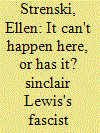

|
|
|
|
|
| Summary/Abstract |
Sinclair Lewis, the first American to win the Nobel Prize in Literature, anticipated many aspects of Donald J. Trump's 2016 campaign and election in his 1935 satirical dystopia, It Can't Happen Here. It was his most popular novel to date and is still satisfying, thought-provoking political theater. Lewis was influenced by growing totalitarianism in Europe, reported on by his second wife, foreign correspondent, Dorothy Thompson. Noting the power of Father Coughlin and Huey Long, among others, to mobilize a public still suffering from the Great Depression, Lewis feared a fascist takeover of the American government by democratic means. Lewis's fictional nightmare features a loutish, ignorant demagogue, who is manipulated by a sinister ghostwriter adviser. With support from a resentful League of Forgotten Men, the demagogue is elected President and quickly establishes a military, racist, and anti-Semitic dictatorship. It Can't Happen Here dramatizes the dire consequences of this takeover, which is not taken seriously at first by Lewis's newspaper editor protagonist, but then is increasingly resisted. Lewis is a social satirist in the Mark Twain tradition, and his novel is worth reading today for its suggestive parallels with current history and its good-hearted humor.
|
|
|
|
|
|
|
|
|
|
|
|
|
|
|
|
| 6 |
ID:
084160
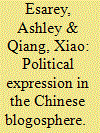

|
|
|
| 7 |
ID:
183996
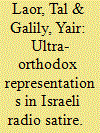

|
|
|
|
|
| Summary/Abstract |
The growing power of the media to define social values and perceptions is a conspicuous feature of contemporary life. Radio is one such shaper of social reality perceptions. While much of the media research focuses on secular organisations operating in a Western, liberal context, not much attention has been paid to this tension between religion and modernity within media outlets. This article examines representations of Israel’s Jewish ultra-orthodox minority in Israel’s daily radio satire shows, a popular and intuitive medium. It shows that content is usually based on the broadcasters’ spontaneous feelings contrary to other media. The findings in the article depict an isolated community out of touch with public consensus and mainstream society.
|
|
|
|
|
|
|
|
|
|
|
|
|
|
|
|
| 8 |
ID:
085011
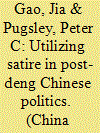

|
|
|
|
|
| Publication |
2008.
|
| Summary/Abstract |
Although China's institutional campaign against the Falun Gong has been closely observed and analyzed, researchers have failed to take note of the subversive power of satire utilized in the comic theatrical skits (xiaopin) of popular comedian Zhao Benshan to ridicule the Falun Gong. This exemplifies the Chinese Communist Party's long-established political practice of "educating the masses." Based on an analysis of what are now commonly referred to as "Zhao Benshan xiaopin" and their perceived impact on the Falun Gong issue, this article examines how satirical power in post-Deng Chinese politics has been employed, and it outlines the key features of the practice. This article reviews the use of satire as a political weapon in contemporary Chinese politics, before turning to focus on four relevant Zhao Benshan xiaopin and the way in which they create popular metaphors for propagating official views in the anti-Falun Gong campaign
|
|
|
|
|
|
|
|
|
|
|
|
|
|
|
|
| 9 |
ID:
085322
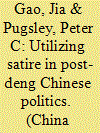

|
|
|
|
|
| Publication |
2008.
|
| Summary/Abstract |
Although China's institutional campaign against the Falun Gong has been closely observed and analyzed, researchers have failed to take note of the subversive power of satire utilized in the comic theatrical skits (xiaopin) of popular comedian Zhao Benshan to ridicule the Falun Gong. This exemplifies the Chinese Communist Party's long-established political practice of "educating the masses." Based on an analysis of what are now commonly referred to as "Zhao Benshan xiaopin" and their perceived impact on the Falun Gong issue, this article examines how satirical power in post-Deng Chinese politics has been employed, and it outlines the key features of the practice. This article reviews the use of satire as a political weapon in contemporary Chinese politics, before turning to focus on four relevant Zhao Benshan xiaopin and the way in which they create popular metaphors for propagating official views in the anti-Falun Gong campaign
|
|
|
|
|
|
|
|
|
|
|
|
|
|
|
|
|
|
|
|
|